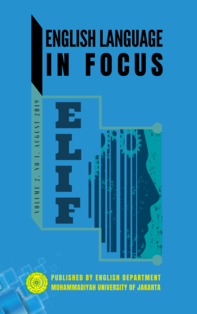Blending Wattpad Platform and English Prose Course in Industrial Revolution Era 4.0
DOI:
https://doi.org/10.24853/elif.2.1.25-32Keywords:
blended learning, wattpad platform, English prose courseAbstract
This paper focuses on an exploration of Wattpad platforms and English prose course as blended learning models in undergraduate students. In the era of industrial revolution 4.0, the use of blended learning models is an alternative solution to the challenges of the times in integrating technological progress with learning. This study used descriptive qualitative research method to examine the concept of blending of wattpad platforms and English prose course. This research finding showed that wattpad platforms as a digital media resources contain intellectual property in the form of prose literary works with various genres. It is very interesting to be used as English teaching material. Wattpad offers easy access to English prose material so that it is more flexible to maximize the time and place of the English learning process. English prose that contains language content such as vocabulary, phrases, sentences, and dialogues which become the media of the writer to express his ideas to his readers. The use of wattpad platforms media helps students as literary readers in transferring the contents of literary works to their readers to obtain a more meaningful learning process because it is rich in moral and social values. In addition, wattpad platforms offer opportunities to respond and appreciate literary work through the reader response features provided by wattpad. Through blended learning design, English learning process can be done either face-to-face or online between lecturers and students to provide maximum learning outcomes. In the end, the learning design of the blending wattpad platforms with the English prose course is expected to be implemented as an alternative in learning English processes for advanced learners.References
Alkhaleel, A. (2019). The Advantages of Using Blended Learning in Studying English as a Foreign Language at the University of Tabuk. Modern Journal of Language Teaching Methods (MJLTM), 1–7. https://doi.org/10.26655/mjltm.2019.2.5
Bal, M. (2018). Reading and Writing Experiences of Middle School Students in the Digital Age: Wattpad Sample. International Journal of Education and Literacy Studies, 6(2), 89–100. Retrieved from http://www.journals.aiac.org.au/index.php/IJELS/article/view/4439/3441
Bold, M. R. (2018). The Return of the Social Author: Negotiating Authority and Influence on Wattpad. Convergence: The International Journal of Research into New Media Technologies, 24(2), 117–136. https://doi.org/10.1177/1354856516654459
Ebrahimi, S. S. (2016). Effect of Digital Reading on Comprehension of English Prose Texts in EFL/ESL Contexts. International Journal of English Language and Literature Studies, 5(2), 111–117. Retrieved from https://ideas.repec.org/a/asi/ijells/2016p111-117.html
Ezeokoli, F. O. (2016). Effects of Two Methods of Instruction on Students’ Critical Response to Prose Literature Text in English in Some Secondary Schools in Benin City. International Journal of Education and Practice, 4(5), 167–182. https://doi.org/10.18488/journal.61/2016.4.5/61.5.167.182
Gill, R. (1995). Mastering English Literature. London: Macmillan International Higher Education.
Jeffrey, L., Milne, J., Suddaby, G., & Higgins, A. (2014). Blended Learning: How Teachers Balance the Blend of Online and Classroom Components. Journal of Information Technology Education: Research, 13, 121–140. https://doi.org/10.28945/1968
Nassaji, H. (2015). Qualitative and Descriptive Research: Data Type Versus Data Analysis. Language Teaching Research, 19(2), 129–132. https://doi.org/10.1177/1362168815572747
Novianti, N. (2016). English Literature Teaching: An Indonesian Context. Indonesian Journal of Applied Linguistics, 6(1), 42. https://doi.org/10.17509/ijal.v6i1.2660
Rebora, S., & Pianzola, F. (2018). A New Research Programme for Reading Research: Analysing Comments in the Margins on Wattpad. DigitCult - Scientific Journal on Digital Cultures, 3(2), 19–36. https://doi.org/10.4399/97888255181532
Tevdovska, E. S. (2016). Literature in ELT Setting: Students’ Attitudes and Preferences towards Literary Texts. Procedia - Social and Behavioral Sciences, 232, 161–169. https://doi.org/10.1016/j.sbspro.2016.10.041
Tirocchi, S. (2018). Wattpad. In C. A. Scolari (Ed.), Teen Media and Collaborative Culture (pp. 93–97). Barcelona: Universitat Pompeu Fabra.
Downloads
Published
Issue
Section
License
Authors who publish with this journal agree to the following terms:
- Authors retain copyright and grant the journal right of first publication with the work simultaneously licensed under a Creative Commons Attribution License that allows others to share the work with an acknowledgment of the work's authorship and initial publication in this journal.
- Authors can enter into separate, additional contractual arrangements for the non-exclusive distribution of the journal's published version of the work (e.g., post it to an institutional repository or publish it in a book), with an acknowledgment of its initial publication in this journal.
- Authors are permitted and encouraged to post their work online (e.g., in institutional repositories or on their website) before and during the submission process, as it can lead to productive exchanges, as well as earlier and greater citation of published work (See The Effect of Open Access).


